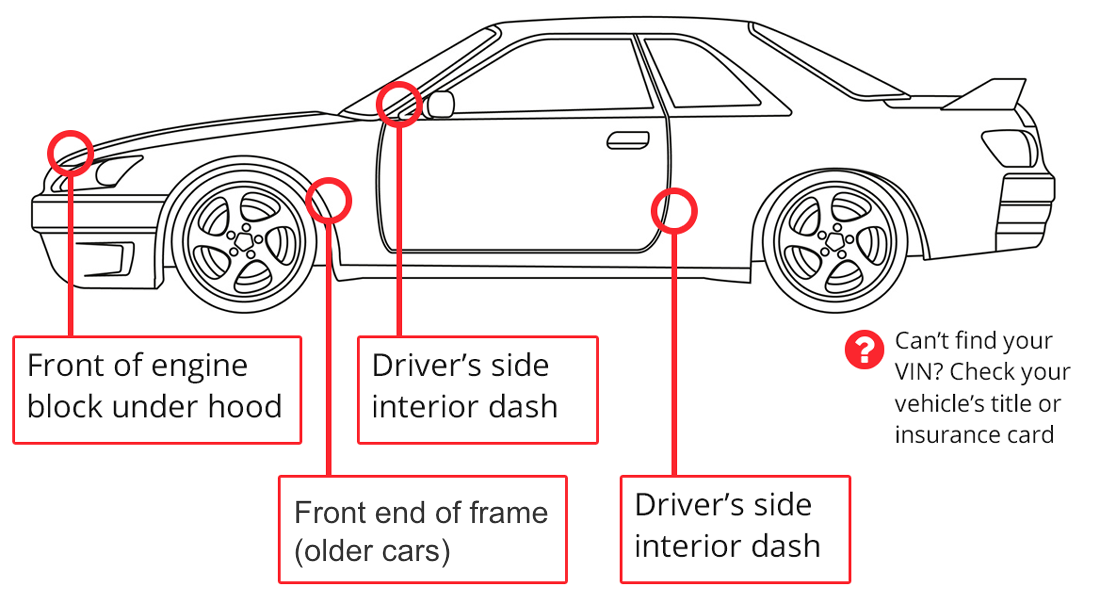Where is the VIN Located on the RV?
Unlike passenger cars locating the VIN on some RVs may be a bit tricky. However, it is vital you do not skip this step as it is vital that you are able to properly record the VIN number as displayed on the vehicle itself. This way, you can protect yourself against dishonest sellers who may attempt to provide you a different VIN in order to conceal the vehicles condition or legal status.
Some motorhomes may have two VIN numbers associated with them: a Chassis VIN and an RV Unit VIN. That's because they are regarded as multi-stage vehicles, having two different manufacturers. You may need to contact the manufacturer to verify if the RV has dual VIN numbers.
The most common placement of the VIN for most RVs (Class A, B, & C motorhomes) is on the driver's door jamb. If you don't find it here, look through the windscreen at the driver's side dashboard, checking for a metal plate or sticker with the 17-digit VIN. You can also check under the hood on the engine firewall or radiator support bracket. Additionally the VIN number may be located in the following areas on the RV:

Front exterior wall on the driver's side

Under the propane tanks

On the bottom located on the frame behind the hitch coupler

Under the front or rear end frame

On the pin box mount framework

Inside one of the wheel wells

Inside of the doorframe

Next to the cargo carrying capacity sticker

Near the axles

On the metal frame (Used a secondary placement in case the sticker fades
out).

Generally, RV VIN numbers will be found on legal documents such as title and registration, but it is strongly advised that you compare and confirm the numbers match with the numbers displayed on the vehicle itself. You do not want to fall victim to unscrupulous sellers that may misrepresent the vehicle by forging the VINs on the actual legal documents.
By gathering data from thousands of sources, including government agencies such as the NMVTIS, insurance companies, and various vehicle data reporting entities VinCheckUp can offer a detailed RV History Reports. This report can be generated with one simple VIN check.
What Information can an RV VIN Check uncover?
A VIN check is a crucial part of the RV buying process as it may help uncover undisclosed events and issues that may affect the vehicle's value, road worthiness and safety. Here is some of the information that a full RV History Report may contain:

Accident History
Detailed reports on any accidents the vehicle has been involved in, including the severity of the accidents and the extent of the damage.

Vehicle Specifications
Detailed specifications about the vehicle, including its make, model, year, engine type, and more...

Title Information
Crucial details about the vehicle's title, such as whether it has a clean title, salvaged title, or any other issues that may impact its value.

Vehicle MSRP & Value
Vehicle's original MSRP as well as an estimation of the current market value, helping buyers and sellers determine a fair and competitive price.

Odometer Readings
Verification of the accuracy of the reported mileage to prevent odometer fraud.

Fuel Efficiency
Information about the vehicle's fuel efficiency, giving potential buyers insights into it's operational costs.

Sale & Lien Records
Reports may contain sale and lien related data such as sale dates, repossession, sale amounts, lienholder/bank names, locations and status.

Photos
Images of the vehicle pre and post accident can help aid in determining accident location and severity.

Ownership History
An ownership history, including the number of previous owners and the duration of each ownership.

Title Records & Brands
Recognition of any significant event that could lead the insurance company to declare the car a total loss and assign specific designations to the vehicle title, including Junk or salvage, rebuilt, theft recovery, TMU (True Mileage Unknown), and more...

Recall Information
Details about manufacturer recalls, indicating whether the vehicle has been subject to any recalls and if the necessary repairs have been made.

Vehicle Commercial Use
Records indicating whether the vehicle has been used as a taxi, law enforcement vehicle, rental car or used for any other commercial purposes

Warranties
Reports may reveal existing warranty information coverage dates and millage restrictions.

Auction Records
Owners provide their unbiased opinions about vehicle's performance, reliability and value.






